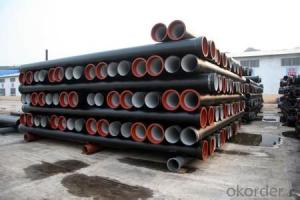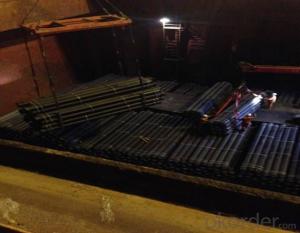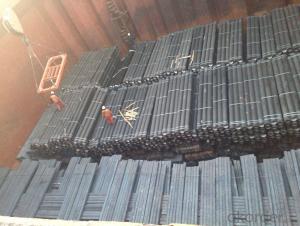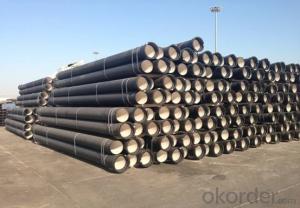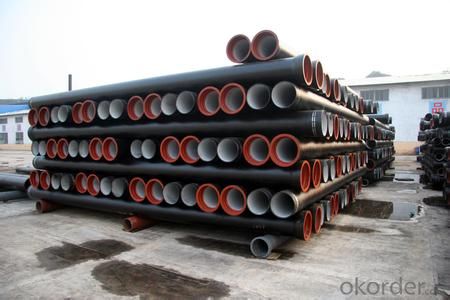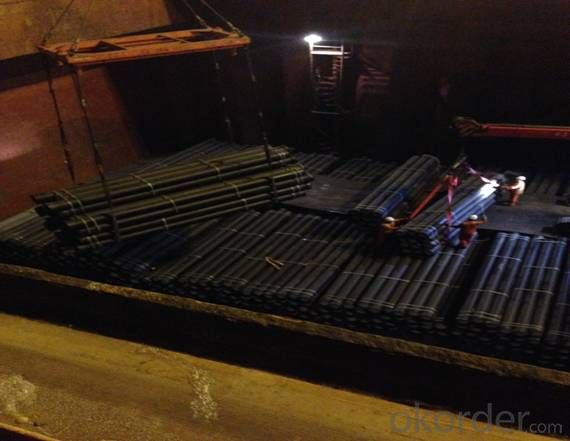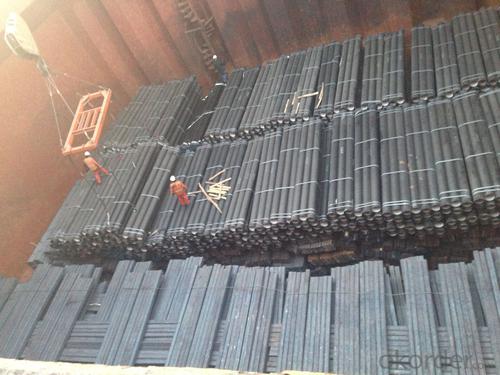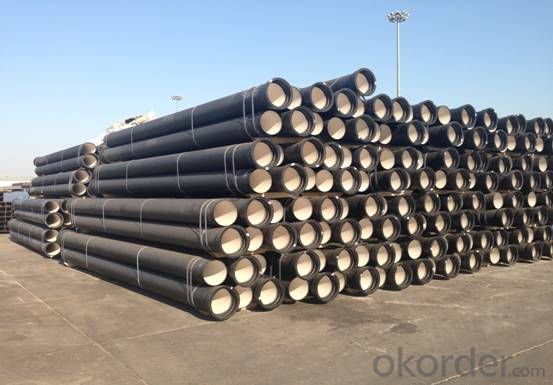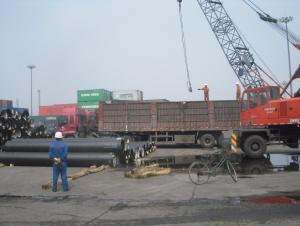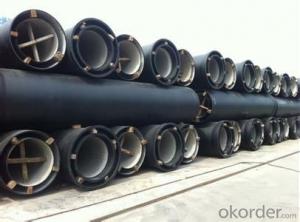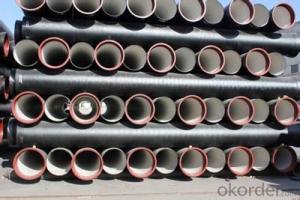DUCTILE IRON PIPE K8 DN400
- Loading Port:
- China Main Port
- Payment Terms:
- TT OR LC
- Min Order Qty:
- -
- Supply Capability:
- -
OKorder Service Pledge
OKorder Financial Service
You Might Also Like
Ductile Iron Cast Pipe is without any defects compare with tradition casting tech, which has many advantages particularly as follow:
(1) High density. In the "vertical upward casting" process, the melt iron of centre liquid column in center crystallizer is continuously feeding for volume shrinkage caused by condensation tube at outer circumference , which lead to be free of shrinkage porosity.
(2) High purity. When melt iron pouring, the mixed impurities such as gas, dross, sand grain which are lighter than melt iron could be eliminated at furnace mouth, its impossible to enter into the crystallizer through the channel, so the melt iron into the crystallizer is very pure.
(3) Strength with toughness. The cooling speed provided by continuous crystallizer is 30 times than sand casting and 5 times than centrifugal casting, and doesn't produce white iron, the eutectic cell volume of continuous cast iron is one eighth to one tenth compare with traditional cast iron. The density of graphite nodule in ductile iron can reach 300-700 pcs/mm2. Therefore, all reason above improve the strength and toughness of continuous cast iron.
(4) Free machining. The high speed cooling make the hardening phase (such as boride, steadite) not appear like reticular, massive or thick, but diffuse like fish bone and pane in shape, moreover, there are tiny graphite flakes inlaid hardening phase. It's free machining in BrinellHardness the range of 250-300HB. However, the Brinell Hardness of 250 is top limit to common metal materials.
(5) Uniform composition of tube wall. The convection mixing of liquid column caused by marching type drawing in crystallizer make the composition of tube wall well-distributed, and concentration gradient very little.
(6) High productivity. To the wall thickness of tube under 10mm, the speed of continuous casting is 1 meter/min, to the wall thickness of tube under 20mm, the speed of continuous casting is 0.5 meter/min, which is high efficiency that centrifugal or other casting tech couldn't reach.
- Q: What are the common pressure ratings for ductile iron pipes?
- The pressure ratings for ductile iron pipes can vary depending on the application and industry standards. However, the most commonly used pressure ratings are Class 150, Class 200, Class 250, and Class 350. For low-pressure applications, Class 150 ductile iron pipes are typically used. These pipes have a working pressure of up to 150 psi and are commonly used for water distribution systems, irrigation, and gravity flow sewer systems. For applications requiring slightly higher pressure, such as industrial water supply and fire protection systems, Class 200 ductile iron pipes are used. These pipes have a working pressure of up to 200 psi. For more demanding applications, Class 250 ductile iron pipes are suitable. These pipes have a working pressure of up to 250 psi and are used for high-pressure water supply systems, power plants, and municipal water distribution networks. For heavy-duty applications, such as industrial water supply and oil and gas pipelines, Class 350 ductile iron pipes are used. These pipes have the highest working pressure rating, with a maximum pressure of up to 350 psi. It is important to note that these pressure ratings are general guidelines and can vary depending on the manufacturer and product specifications. Consulting industry standards and guidelines, as well as working with qualified engineers and professionals, is crucial to ensure the correct pressure rating is selected for a specific ductile iron pipe application.
- Q: Can ductile iron pipe be used for geothermal heat exchange systems?
- Yes, ductile iron pipe can be used for geothermal heat exchange systems. Ductile iron pipe is known for its strength and durability, making it suitable for underground applications such as geothermal heat exchange systems. Additionally, it has good corrosion resistance and can withstand high temperatures, which are important factors in geothermal systems.
- Q: Are ductile iron pipes resistant to chemical attacks?
- Yes, ductile iron pipes are generally resistant to chemical attacks. They have a protective lining that prevents the corrosive effects of various chemicals, making them suitable for transporting a wide range of liquids including water, sewage, and industrial waste.
- Q: How are leaks repaired in ductile iron pipe?
- Leaks in ductile iron pipe are typically repaired by cleaning and preparing the area around the leak, applying a suitable sealant or epoxy, and then securely fastening a repair clamp over the affected area. This clamp provides a tight seal and prevents any further leakage.
- Q: What are the different pressure ratings available for ductile iron pipe?
- The pressure ratings available for ductile iron pipe typically range from 150 psi to 350 psi, depending on the size and application of the pipe.
- Q: What is the difference between ductile iron and cast iron pipes?
- Ductile iron and cast iron pipes are both popular materials used in plumbing systems, but they have distinct differences in terms of composition, strength, and flexibility. 1. Composition: Ductile iron pipes are made from ductile iron, which is a type of cast iron that has been treated with trace amounts of magnesium to enhance its flexibility and strength. On the other hand, cast iron pipes are made from regular cast iron, which is more brittle and less malleable. 2. Strength: Ductile iron pipes are significantly stronger than cast iron pipes. Ductile iron has a higher tensile strength, meaning it can withstand higher levels of internal and external pressure. This makes it more suitable for applications where high strength is required, such as water mains or sewer lines. Cast iron pipes, on the other hand, are more prone to cracking or breaking under pressure. 3. Flexibility: Ductile iron pipes have greater flexibility compared to cast iron pipes. This flexibility allows them to withstand ground movement, making them less susceptible to damage or breakage caused by settling or shifting soil. Cast iron pipes, due to their inherent brittleness, are more likely to crack or separate when exposed to ground movement or vibrations. 4. Installation: Ductile iron pipes are typically joined using a mechanical joint or flanged joint, which provides a secure and leak-proof connection. On the other hand, cast iron pipes are usually joined using a bell-and-spigot joint, which relies on gaskets or lead caulking to create a seal. The mechanical joint used in ductile iron pipes offers better resistance to movement and external forces. 5. Cost: Ductile iron pipes are generally more expensive than cast iron pipes. The additional treatment process and higher strength of ductile iron contribute to the increased cost. However, the added durability and longer lifespan of ductile iron pipes can offset the initial investment, as they may require fewer repairs or replacements over time. In summary, the main differences between ductile iron and cast iron pipes lie in their composition, strength, flexibility, installation methods, and cost. Ductile iron pipes offer superior strength and flexibility, making them more suitable for demanding applications, while cast iron pipes are more brittle and prone to breakage. Ultimately, the choice between the two depends on the specific requirements of the plumbing system and the available budget.
- Q: How do ductile iron pipes handle water hammer?
- Ductile iron pipes are well-suited to handle water hammer due to their inherent strength and flexibility. The high tensile strength of ductile iron helps absorb and dampen the pressure surges caused by water hammer, preventing any significant damage to the pipes. Additionally, the inherent ductility of these pipes allows them to flex and absorb the impact of water hammer, reducing the likelihood of cracks or bursts. Overall, ductile iron pipes provide a reliable and durable solution for managing water hammer in water distribution systems.
- Q: What is the average cost of ductile iron pipe?
- The average cost of ductile iron pipe can vary depending on factors such as the size, length, and location. However, as of 2021, the average cost for ductile iron pipe ranges from $10 to $20 per linear foot.
- Q: How does ductile iron pipe compare to PVC pipe in terms of strength?
- Ductile iron pipe is generally stronger than PVC pipe in terms of strength. Ductile iron has a higher tensile strength and can withstand higher pressures and heavier loads compared to PVC, making it suitable for applications that require greater durability and strength.
- Q: Can ductile iron pipes be used for underground cable conduits?
- Yes, ductile iron pipes can be used for underground cable conduits. Ductile iron pipes are known for their strength, durability, and corrosion resistance, making them suitable for various applications, including underground cable conduits. Their ability to withstand heavy loads and external pressures makes them a reliable choice for protecting and housing underground cables.
Send your message to us
DUCTILE IRON PIPE K8 DN400
- Loading Port:
- China Main Port
- Payment Terms:
- TT OR LC
- Min Order Qty:
- -
- Supply Capability:
- -
OKorder Service Pledge
OKorder Financial Service
Similar products
Hot products
Hot Searches
Related keywords
